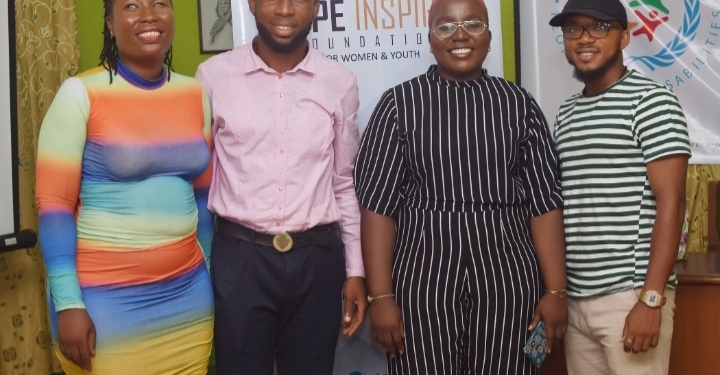The Hope Inspired Foundation for women and Youth (HIFWY) has called for more media reportage on plights and issues facing Persons with Disabilities (PWDs) in Nigeria.
The call was made at a programme organized by HIFWY in partnership with Journalist Against AIDS (JAAIDS), Lagos State Office Of Disability Affairs (LASODA) and the Joint National Association of Persons with Disability (JONAPWD) under its project titled: “Improving Sexuality Education for the Empowerment of Women and Girls with Disabilities” funded by Disability Rights Fund.
HIFWY, at the programme which was organized to commemorate the International Day of Persons with Disabilities (IDPD) 2021, also called for more actions and empathy on the part of the government and people living around persons with disabilities.
Lamenting how persons with disabilities are being treated, the group said PWDs are being discriminated, while noting that there has been a surge in cases of sexual violence against PWDs.
Calling for an end to sexual discrimination against persons with disabilities, the Executive Director of HIFWY, Janet Olanrewaju, said there is the need to empower PWDs especially Women with Disabilities (WWDs) with education on sexual and reproductive health rights in order to understand their rights as pointed out by the World Health Organization.
Olanrewaju noted that sexuality education is paramount for persons with disability in other to empower them to advocate for their rights and also help to end violence against women with disability
She said, “sexuality is a global issue, central to human development and thus requires a positive and respectful approach to sexuality and sexual relationships as well as the possibility of having pleasurable and safe sexual experiences, free of coercion, discrimination, and violence.
“Armed with knowledge about sexual rights, and differences between “healthy” and –risky sexual choices and exchanges, PWDs are also better positioned to resist sexual violence and abuse in different social spaces,” she added.
The HIFWY ED who noted that, “though sexual education is still being seen as a taboo in Nigeria due to ignorance, cultural and religious beliefs, the issue is more compounded when it comes to educating people with disabilities due to the “lack of capacity and adequate knowledge to provide disability inclusive sexuality education by parents/caregivers, teachers, and educators”.
Explaining the consequences of lack of sexuality education as it affects PWDs, the Programme Manager of HIFWY, Adebimpe Lawal, said the absence of sexuality education has led to high rates of unwanted pregnancy among women and girls with disabilities, as well as an increase in the contraction of sexually transmitted diseases and infections and exposure to COVID-19.
“This has subsequently led to gender-based violence, low self-esteem and mental health illness, drug abuse and even suicide,” Lawal added.
She therefore appealed that sexuality education should be developmentally appropriate and continuous throughout the lifespan of all PWDs, especially women and girls as well as appropriate inclusive and accessible sexuality curriculum for teachers, to better convey sexuality education to persons with disability.
She also said there must be “continuous sensitization to teachers, counsellors, health workers, parent and caregivers to better equip them on how to use sensitive language, understand, and various inclusive and accessible strategies to use when conveying sexuality education to PWDs.
“Equipping PWDs and especially WWDs with necessary skills, information and equipment’s that will help strengthen their knowledge on sexuality education, sexuality expression and sexuality rights.
“Provision of sexuality education in accessible and inclusive format focusing on each peculiar disability through all channels,” Lawal added.
Urging the media to amplify their voices in creating more awareness on issues affecting people with disabilities, HIFWY’s Program Assistant, Rahman Finnih, called on the government to put in place measures and amenities to make the country habitable and safe for persons with disabilities.
He, however, noted that the media plays an essential role in disseminating information about sexuality especially as it relates to persons with disabilities, the media in Nigeria has not lived up to its task as expected.
Finnih urged the media to be inclusive when putting information in any platform and ensuring the information is accessible to persons with disability.
He added that the media must help to “advocate, enlighten and clarify the misconception of the society about persons with disability sexuality; promote the need for a continuous sexuality education and access to sexuality rights for PWDs; sensitize the public and promote a better safe place for PWDs to learn and express their sexual rights; and create publicity for the sexuality manual developed and published by Hope Inspired Foundation for Women and Youth in reaching the grassroots.”

